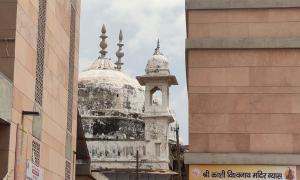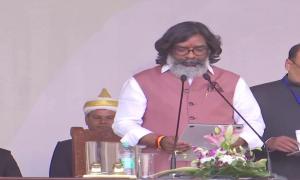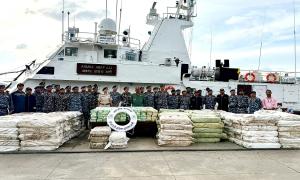India has asked Pakistan to extradite Mumbai blasts accused Dawood Ibrahim along with the hijackers of Indian Airlines flight to Kandahar in 1999 and jihadi leaders Hafeez Saeed and Masood Azhar in a list of 38 wanted people handed over to Islamabad during the current round of home secretary-level talks being held in Islamabad.
The list was given by Home Secretary V K Duggal to his Pakistan counterpart Syed Kamal Shah.
Pakistan, while feigning ignorance about Dawood's whereabouts, handed over a list of 58 "criminals", including a "most wanted criminal" called Javed Langra, who they believe is hiding in India.
Duggal and Shah swapped the lists during the first round of talks on Tuesday.
While rejecting the allegation of promoting terrorism in India, Islamabad claimed that the country itself was a victim of terrorism for playing the role of a frontline state in the war against terror.
According to the briefing held by Pakistan officials, the Indian list included head of another banned militant outfit Jaish-e-Mohammed Masood Azhar.
Pakistan has said it would not hand over any of its nationals to India for prosecution, which included Hafeez and Azhar.
The hijackers of the Kandahar flight, which was seized to get the release of Azhar and his associate Omar Sheikh, were all believed to be Pakistanis.
India identified the hijackers as Mohammad Ibrahim Athar Alvi, Zahoor Ibrahim Mistri, Shahid Akhtar Sayed, Shakir Mohammad and Azhar Yusuf.
Azhar continues to head JeM while Sheikh, a British-born Pakistani, was sentenced to death by a Pakistan court for the killing of US journalist Daniel Pearl.
The home secretaries' meeting, held for the third time under the auspices of the composite dialogue process, also discussed the Extradition Treaty, which Pakistan in the past linked to resolution of Kashmir and other contentious issues.
Countering Indian allegation of sponsoring terrorism, Pakistan accused the Indian consulates in Afghanistan of promoting insurgency in its southwest Balochistan province, a charge India has denied consistently.
On the prisoners' issues, the two sides agreed to provide consular access to prisoners within three months from the date of their arrest. It was decided that in future such arrests would be notified soon by both the countries.
However, the Indian delegation pointed it out to Pakistan that over 600 Indian prisoners, including 505 fishermen, languished in Pakistani prisons and demanded consular access to them.
The Pakistan side said 472 of its prisoners languished in Indian jails.
Out of them, 147 have not been provided consular access, the officials said.
As a goodwill gesture ahead of the talks which began on Tuesday, India released 59 fishermen while Pakistan released 79.
Both sides reviewed progress on their discussion for narcotics control.
They also discussed the possibility of cooperation in police training and crime investigation.








More from rediff